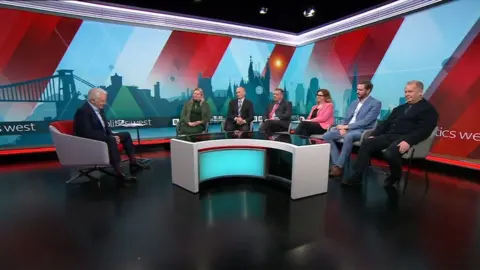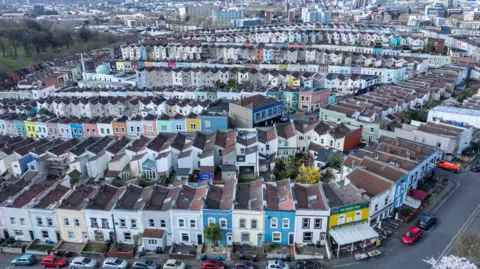Candidates clash in contest to be Weca mayor
 BBC
BBCThe six contenders in the election to lead the West of England Combined Authority (Weca) have taken part in the biggest debate of the campaign.
They went head to head in the BBC Bristol TV studio on Friday, for a special edition of Politics West focusing on the upcoming mayoral election.
There was much talk of how to make it easier to get around on the area's congested roads and improving buses.
But in a time of tight budgets, there was little talk of grander infrastructure plans.
What does Weca do?
The role of Weca mayor was created as part of a devolution deal giving more decision-making to English regions rather than focusing power in Westminster alone.
Weca takes in the local authority areas of Bristol, Bath and North East Somerset (Banes) and South Gloucestershire and it is tasked with improving public transport, training and job opportunities, and supporting businesses. It also oversees the region's housing plans.
 Getty Images
Getty ImagesThe Conservatives were beaten into second place in the 2021 election and have strongly criticised what has happened since, which has seen the authority placed in special measures. The candidates criticised the outgoing mayor.
Steve Smith for the Conservatives vowed to "end the war on motorists" and to "completely redesign" the region's bus network.
Liberal Democrat Oli Henman said there was no place for mayors with "big egos", adding: "The key thing her is someone who's actually got practical experience of bringing people together in the area."
Labour's candidate insisted she would be different from the incumbent Labour mayor if elected.
"What you're getting with me is a very different type of candidate, I've come with different experience," said Labour's Helen Godwin.
"This is actually about how we move forward."
All six candidates advocated for better buses, and criticised cuts to some subsidised services.
But no one talked up the possibility of delivering previously mooted projects like a tube network for Bristol or a trams in Bristol and Bath.
"It's pie in the sky there's going to be an underground in Bristol, it's not a big enough city for that," said Arron Banks from Reform UK. "It's not going to happen."
Independent candidate Ian Scott was also sceptical about funding for big projects, and accused the government of favouring other regions compared to the West.
"West Yorkshire are in the Premier League, West of England are in the Third Division," he remarked.
Mr Henman did voice support for a regional light rail system "in the longer term" and the possibility of a regional investment fund to attract private investment.
The line-up includes one who has previously been a mayoral candidate – but for a different party.
"I've left one party because it ceased to serve the needs of the people I want to represent," the Greens' Mary Page said of the Liberal Democrats.
"The biggest challenge now is climate change."
There will be more debates taking place before polling day on 1 May – but all six candidates knew none would be bigger than this.
Follow BBC Bristol on Facebook, X and Instagram. Send your story ideas to us on email or via WhatsApp on 0800 313 4630.
